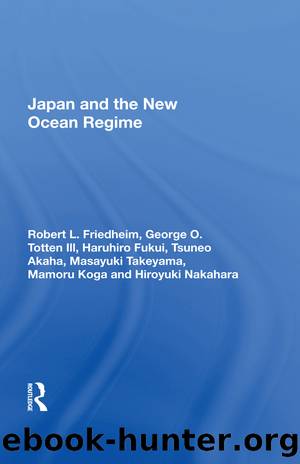Japan and the New Ocean Regime by Robert L Friedheim

Author:Robert L Friedheim [Friedheim, Robert L]
Language: eng
Format: epub
ISBN: 9780429745669
Goodreads: 44598672
Publisher: Routledge
Published: 2019-02-22T00:00:00+00:00
Chapter 6
A Cybernetic Analysis of Japanâs Fishery Policy Process
by Tsuneo Akaha
One of the most important global trends in the last few decades has been the enclosure of ocean space and resources by the creeping jurisdiction of coastal states.1 At the heart of the global debate between the challengers and the defenders of the traditional ocean regime have been the questions: Who gets what, how, at what cost, or with what obligations, and why, or on what legal or other grounds? Views on these central questions have varied widely, ranging from the assertion, at one extreme, that littoral states have the inherent right to lay exclusive claims to coastal waters and resources, to the other extreme view that the ocean riches belong to all countries and should not be appropriated by national claimants. The developing coastal states, mostly newcomers to global ocean politics and economics, have, by and large, espoused views close to the first position, while the developed countries, particularly the major maritime powers, have at one time or another supported the other position.
In the extreme corner of the matrix of claims and claimants in the global ocean politics has been Japan, one of the most extensive users of the oceans and one of the principal beneficiaries of the principle of freedom of the seas â the very foundation upon which the global ocean political economy of the last one hundred and fifty years has operated. When the established maritime order came under heavy attack, Japanâs prostatus-quo attitude became increasingly pronounced. At the First United Nations Conference on the Law of the Sea (UNCLOS), convened in Geneva in the spring of 1958, Japanese head delegate Akira Oe stated:
[F]reedom of the high seas was established for the purpose of serving the interest and welfare of the entire international community. Extension of the territorial sea would result in an encroachment upon the area of the high seas open to all nations. Should this Conference decide to take such course of action, it would run counter to the development of international law. I sincerely hope that this Conference will be able to reach an agreement on a uniform limit of three miles for the width of the territorial sea.2
Download
This site does not store any files on its server. We only index and link to content provided by other sites. Please contact the content providers to delete copyright contents if any and email us, we'll remove relevant links or contents immediately.
The Lonely City by Olivia Laing(4799)
Animal Frequency by Melissa Alvarez(4462)
All Creatures Great and Small by James Herriot(4311)
Walking by Henry David Thoreau(3953)
Exit West by Mohsin Hamid(3824)
Origin Story: A Big History of Everything by David Christian(3687)
COSMOS by Carl Sagan(3618)
How to Read Water: Clues and Patterns from Puddles to the Sea (Natural Navigation) by Tristan Gooley(3466)
Hedgerow by John Wright(3354)
How to Read Nature by Tristan Gooley(3335)
The Inner Life of Animals by Peter Wohlleben(3311)
How to Do Nothing by Jenny Odell(3294)
Project Animal Farm: An Accidental Journey into the Secret World of Farming and the Truth About Our Food by Sonia Faruqi(3216)
Origin Story by David Christian(3195)
Water by Ian Miller(3179)
A Forest Journey by John Perlin(3069)
The Plant Messiah by Carlos Magdalena(2927)
A Wilder Time by William E. Glassley(2859)
Forests: A Very Short Introduction by Jaboury Ghazoul(2836)
